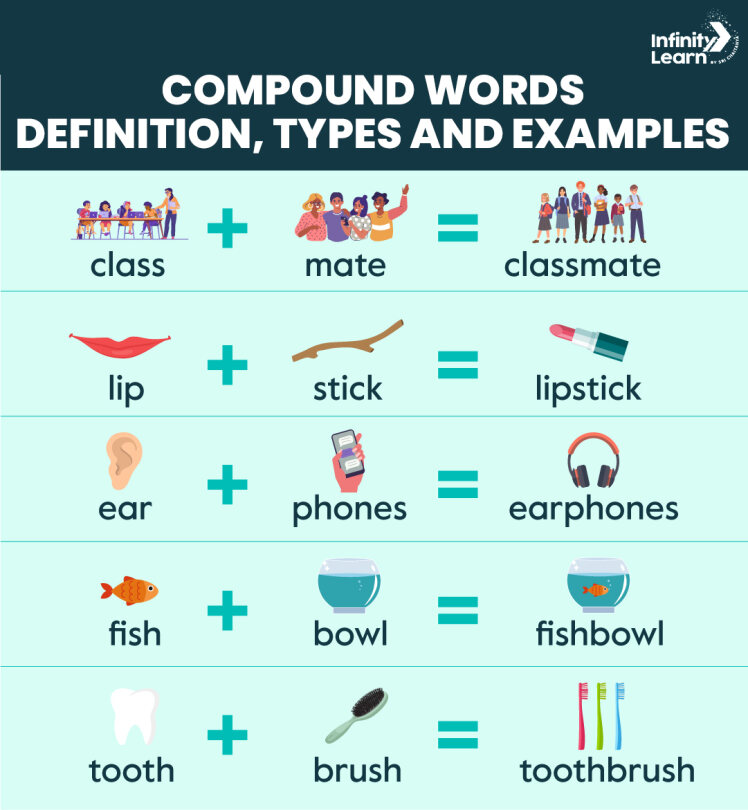Table of Contents
Compound Words: Words can be fascinating on their own, but when you combine them, they become even more powerful and expressive. That’s where compound words come into play. Learning new words expands your vocabulary, and understanding compound words adds depth to language skills. In this blog, we’ll explore the world of compound words, from understanding what they are to learning how they’re formed. By the end, you’ll be able to spot words effortlessly in your everyday reading.

What is a Compound Word?
Combining two or more individual words creates a compound word with its own unique meaning in linguistics. These words can be joined together without spaces, hyphenated, or written as separate words. It play a vital role in language, allowing us to express complex ideas concisely. Various forms of compound words extensively enrich and enhance everyday communication in our language, making it richer and more versatile. Whether it’s a closed word like “bedroom,” a hyphenated one like “mother-in-law,” or an open word like “post office,” understanding these words is fundamental to mastering language comprehension and usage.
3 Types of Compound Words
Based on their structure and how they’re written, we can categorize it into three main types.
- Closed Compound Words:
- These words are formed by combining two or more words without any spaces or hyphens between them. They are written as a single word.
Examples:
- Butterfly: Combines “butter” and “fly” to refer to a colorful insect.
- Football: Merges “foot” and “ball” to describe a popular sport.
- Bedroom: Joins “bed” and “room” to signify a sleeping or resting space.
- Hyphenated Compound Words:
- These words are created by connecting two or more words with hyphens (-) to form a single term. Hyphens are used to clarify meaning or ease pronunciation.
Examples:
- Mother-in-law: Combines “mother” and “law” to denote a person’s spouse’s mother.
- Self-esteem: Merges “self” and “esteem” to describe one’s self-worth or self-respect.
- Up-to-date: Joins “up,” “to,” and “date” to signify being current or current information.
- Open Compound Words:
- Open compound words are written as separate words, and they maintain their individual identities while together conveying a specific meaning.
Examples:
- Post office: Refers to a facility where mail is processed and distributed.
- High school: Describes a secondary educational institution.
- Real estate: Signifies property or land, especially in terms of buying and selling.
These three types of words showcase the versatility and richness of the English language, allowing for a wide range of expressions and concepts. Understanding the distinctions between closed, hyphenated, and open compound words can enhance your language skills and comprehension.
Formation of Compound Words
It is formed when two or more individual words are combined to create a new word with a unique meaning. The formation of words can occur through several methods:
- Noun + Noun: When two nouns are combined, they create a compound word. In this case, one noun typically modifies or describes the other noun, specifying the type or purpose of the compound.Examples:
- Toothpaste: “Tooth” (noun) describes the type of “paste” (noun) used for dental hygiene.
- Bookstore: “Book” (noun) specifies the merchandise available at the “store” (noun).
- Adjective + Noun: The combination of an adjective and a noun forms words that often describe the characteristics or qualities of the noun.Examples:
- Blackboard: “Black” (adjective) describes the color of the “board” (noun).
- Sweetheart: “Sweet” (adjective) characterizes the “heart” (noun) in an affectionate way.
- Verb + Noun: Mixing a verb and a noun results in words that often indicate an action or activity related to the noun.Examples:
- Mailman: “Mail” (verb) is connected to the person who delivers it, the “man” (noun).
- Swimming pool: “Swimming” (verb) indicates the primary activity associated with the “pool” (noun).
- Noun + Verb: In these words, a noun and a verb are combined to express a concept or action associated with the noun.Examples:
- Bookshelf: “Book” (noun) suggests what the “shelf” (verb) is used for.
- Football: “Foot” (noun) describes how the “ball” (verb) is primarily played with.
It’s important to note that the order of words in can sometimes influence its meaning. For instance, “breakdown” and “downfall” have different meanings due to the placement of words.
When forming words, it’s crucial to follow language conventions and, if in doubt, consult a dictionary or style guide for proper spelling and usage. Understanding the formation of words can enhance your vocabulary and language skills, making your communication more precise and effective.
Points to Remember When Forming Compound Words
When forming words in English, there are several important points to keep in mind to ensure correct spelling and usage. Here are some key considerations:
- Hyphenation Rules:
- Follow established hyphenation rules. Some words require hyphens, while others do not.
- Examples of hyphenated words: mother-in-law, well-being, up-to-date.
- Examples of closed words: butterfly, bedroom, football.
- Word Order Matters:
- The order of words in a compound can significantly impact its meaning.
- For example, “breakdown” and “downfall” have different meanings due to the placement of words.
- Be mindful of how word order affects the intended message.
- Use a Dictionary or Style Guide:
- If you are unsure about the spelling or hyphenation of a compound word, consult a reputable dictionary or a style guide.
- Modern dictionaries provide guidance on compound word formation and usage.
- Consideration of Context:
- The context in which a word is used can influence the decision on whether to write it as one word, hyphenated, or as separate words.
- Consider the context to determine the most appropriate format.
Also Read:
| Opposite Words | 3 Letter Words |
| Rhyming Words | English Speech Topics |
Examples of Compound Words
Here are more examples of words, categorized by their type:
Closed Compound Words (Written as One Word):
- Basketball
- Toothbrush
- Raincoat
- Bedroom
- Football
- Breakfast
- Notebook
- Wallpaper
- Worldwide
- Firefly
Hyphenated Compound Words (Joined by Hyphens):
- Mother-in-law
- Well-known
- Up-to-date
- Cross-country
- Self-esteem
- Ex-boyfriend
- Vice-president
- T-shirt
- Over-the-counter
- Spider-man
Open Compound Words (Written as Separate Words):
- Post office
- High school
- Real estate
- Ice cream
- Full moon
- Parking lot
- Swimming pool
- Tooth fairy
- Roller coaster
- Coffee table
These examples showcase how the English language embraces diversity in words, spanning various categories and illustrating their formation. These words are an essential part of vocabulary, helping to express complex ideas succinctly and clearly.
Conclusion
It is an essential part of language, making communication more efficient and expressive. Understanding the three types words, their formation, and following the rules for their usage will enhance your language skills. Next time you read or write, keep an eye out for these intriguing combinations of words that add depth and meaning to our vocabulary.

FAQ’s on Compound Words
What are the 10 examples of compound words?
Here are 10 examples of compound words: butterfly, toothbrush, skateboard, rainbow, football, bedroom, airport, sunflower, moonlight, and popcorn.
Which is a compound word?
A compound word is formed by combining two or more words to create a new word with its own distinct meaning. For instance, football is a compound word formed by combining foot and ball.
What are 30 compound words?
Here are 30 compound words: basketball, firefighter, skyscraper, notebook, mailbox, toothpaste, sunshine, strawberry, keyboard, butterfly, blueberry, waterfall, earring, moonlight, rainbow, weekend, skateboard, airport, starfish, firefly, bedroom, breakfast, football, sunflower, popcorn, rainbow, jellyfish, newspaper, headlight, and earthquake.
What is a compound word in English?
A compound word in English is a combination of two or more separate words that join together to form a new word with its unique meaning.
यौगिक शब्द कौन सा है? (What is a compound word?)
A compound word (यौगिक शब्द) is formed by merging two or more words together to create a new word with a specific meaning in a language, such as English.









